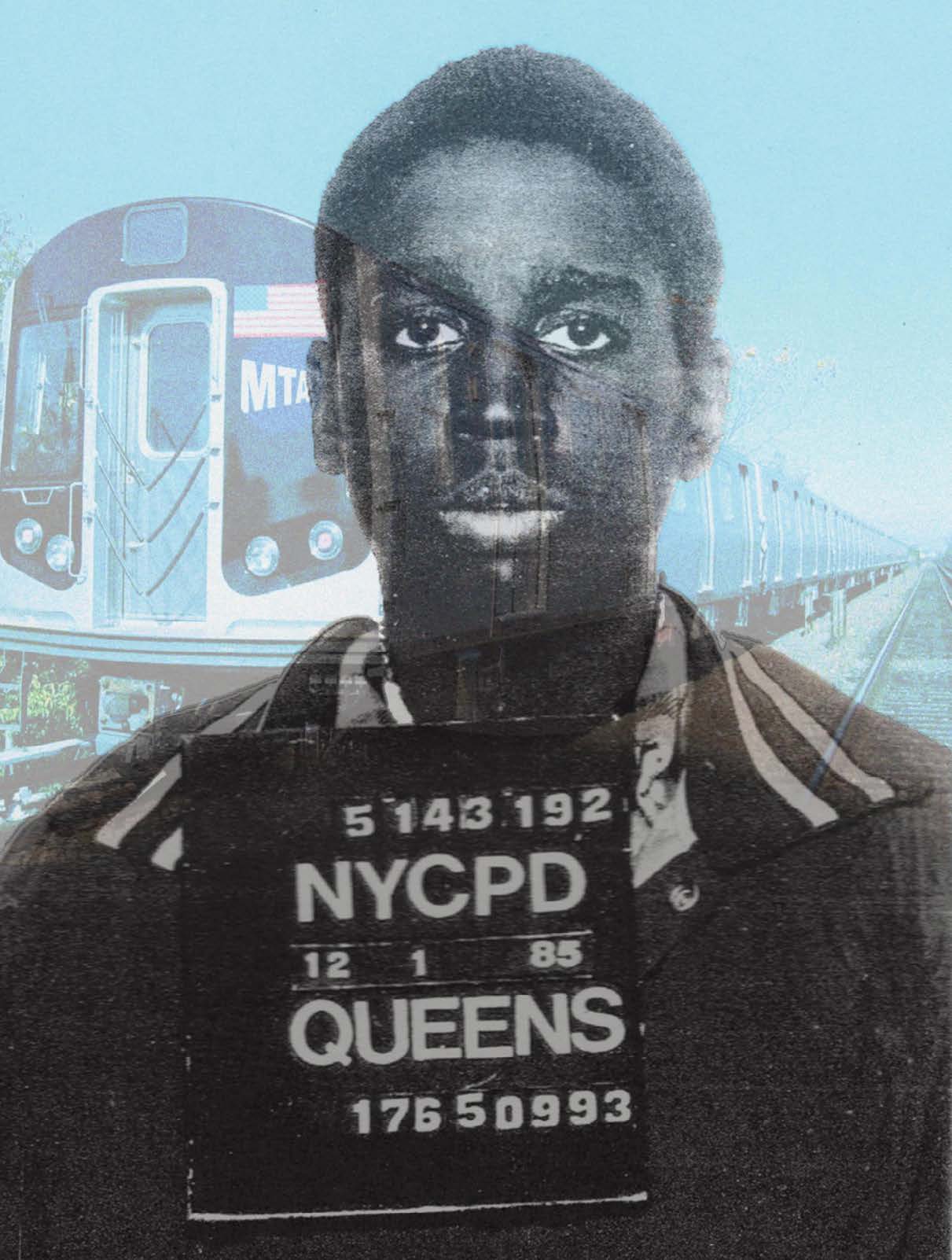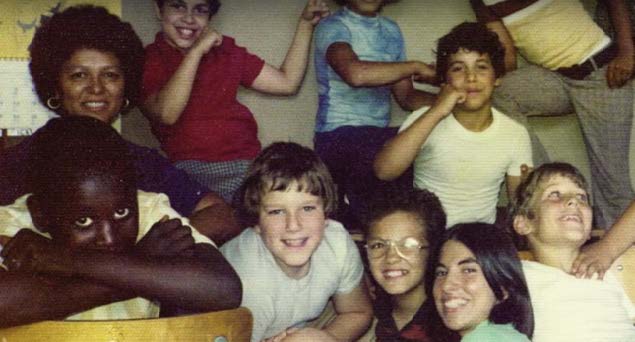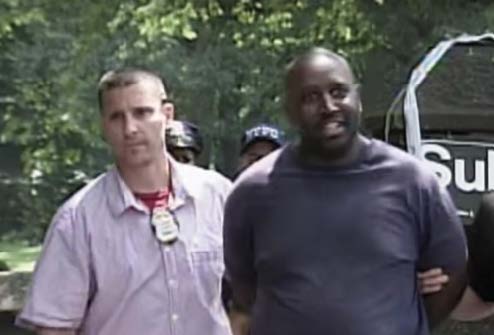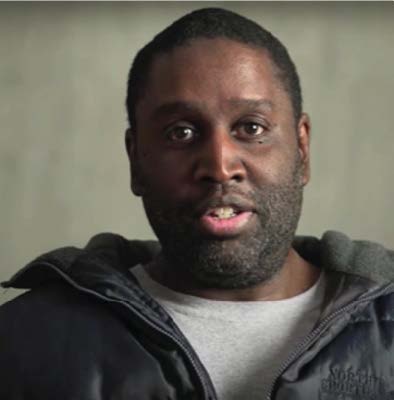
IN THE END, DARIUS MCCOLLUM WAS POOR AND BLACK
BY MICHAEL JOHN CARLEY
"Darius didn't present like me, but I knew that if you took away the experiences of being stabbed repeatedly with large scissors when he was in second grade, the horrific prison rapes and beatings, the lifelong trauma, the brilliance… and that if you then took away my educational opportunities, and blatant white privilege… he was my mirror."
On this past October 5th, Darius McCollum, the autism world's previously-unending sideshow, was sentenced to life inside a New York State psychiatric facility.1 No, he was not relegated back to Rikers island, or any other "normal" prison, as had been the case for the majority of his adult life. He was this time sent to the kind of place where our most dangerous, disturbed, and marginalized individuals are secretly warehoused2 to endure horror after horror3 without witness, until the unmarked, mass grave on Hart Island 4 prematurely, and slowly consumes their trauma-ridden, dissociated selves. Darius' remarkable story of rotating in and out of the prison system for 38 years came to a halt on the worst side of the turnstile. Autism-Schmautism: He is black and poor. We were fools to think this story would end in a restorative manner.
He almost made it. His brilliance, and the subsequent media coverage had all but ensured that he would not slip through the cracks like other poor, spectrum or nonspectrum African-Americans. Darius had a shot because he was noticed. But the final nail came, comic/tragically, from an African-American judge; one who justified ending Darius' life because Asperger's Syndrome, to her, is a "dangerous, mental disorder."5 In the words of Darius' lawyer, Sally Butler, "The sweetest guy in the world, never committed any violent acts, never hurt anyone, is going to be held in a hospital with people who slaughter people." Judge Ruth Shillingford hasn't yet apologized, saying something along the lines of "Ok. Maybe I could have used a better choice of words." But she will. Too many of us have this same "dangerous, mental disorder." The success rate on appeals is very low. He's gone.
Darius McCollum, as most spectrumfolk know, couldn't stop stealing subway trains and taking them on joyrides. His first arrest came when he was 15, and over close to the next four decades, he was caught and sentenced over 30 times.
But by his estimation, he was not caught thousands of times.
Like innumerable spectrum children, young Darius had a "thing" for trains. As a fellow spectrumite myself who works in the field, I've long thought it funny how the clinical world overthought our too common fascination with rail travel. The simple truth of why we love trains has not to do with the trains themselves… it's the track. We don't have to make any decisions about going left here, or right there, thanks to the track. We don't have to read between the lines, or interpret a thing, as we would driving a car. The track has already determined our destination and our route. Furthermore, we have full control over the speed of the journey. For folks like us? That's heaven.
For folks like us? That's heaven. How was this possible, though? How could one man, however Houdini-like, sneak into the driver's seat so easily, time after time after time? Amidst our modern paranoia of mostly imagined terrorist threats looming around every corner, how did Darius manage so easily to take over the controls while we were the passengers? Well, Darius was brilliant. He not only knew the ins and outs of the New York Metropolitan Transit Authority (MTA) ten times better than any MTA employee, he knew the employee timetables, and how the MTA's Human Resource department operated. He knew the trends, and the procedures, and he was also gregarious. Darius McCollum really is the sweetest guy you'll ever meet. So when he'd arrive on the scene in a stolen uniform, and tell the scheduled driver "I just got a free day, man. Lemme help you out." The uninformed, overworked and underpaid MTA employee usually said, "thanks, man," and laid back on a welcomed break. No passenger, it should be noted, was ever hurt when Darius was driving. Not one passenger was even aware that, driving their subway train or bus was someone other than a trained MTA employee. Lastly, Darius' routes were always finished on time.
More than two decades would transpire thereafter that first arrest before we'd hear his name. For us, it all started with a Harper's article from 2002—Jeff Tietz's The Boy Who Loved Transit.6 In the opening paragraphs, Tietz introduced us not only to a train thief, but also a brilliant forger, who brought letters to crews "signed" by MTA managers, dictating that the crews allow "Mr. McCollum" to inspect their safety protocols.
Tietz also showed us a concerned outsider, who always attended MTA workers' union meetings and rallies. Finally, Tietz pointed out to us that Darius only attempted to steal these trains, buses, and equipment. After all, he returned everything he stole. Darius' behavior originated not in contempt. He loved the MTA, and all its inner worlds.
But despite a diagnosis of Asperger's syndrome, one that should have explained his lack of criminal intent, he got idiot judge after idiot judge7 – monsters of an unfair, impotent, racist, and arcane criminal justice system in New York. To them, Darius was too intelligent, too polite, and too "white sounding" (as one judge put it) to both have a disability and not have control over his actions.
I first met Darius around that time. He was out on parole but at high risk for going back. People put high hopes that my new organization, GRASP, could help. GRASP was the first real peer-run (i.e. run by people on the spectrum) organization in the autism world, and later grew to become the largest membership organization in the world for adults on the spectrum. That all said, we didn't have much of a budget, and we weren't a services organization – we had no contract with the city. The type of help that Darius needed wasn't complicated, but it was intensive. He needed talk therapy with a shrink that really knew their Asperger's, peer support, perhaps some Cognitive Behavioral Therapy, some trauma-based therapy, a gym, and a Microsoft Excel class. He came to one GRASP support group meeting, but given his relative stardom, he had a hard time feeling like a part of the group. So he hung out in our office with me on several occasions. I'd work while he'd read. We'd talk. We'd go for walks. We got to know each other.


DERAILED: (Left) Darius with schoolmates in happier days, and (right) being taken into custody one of 30 times over four decades. Not only did he know the employee timetables and the Human Resource department ten times better than any MTA employee, he was also gregarious.
Everyone on the spectrum is different. On one end you might have someone non-verbal, who may never experience a reciprocated sexual relationship, or hold down a steady job for long. But this same individual could in fact be quite happy if surrounded by the right supports and attitudes; as measuring happiness by the capacity for speech is one of the infantile mistakes we used to make in the autism world. Why so stupid? Because on the other end of the spectrum you might have someone very verbal; maybe with an IQ of 180 – we have all these famous people diagnosed in retrospect such as Einstein, Beethoven, Edison, Jefferson, Emily Dickinson, every famous mathematician – whom everyone expects to be the CEO of a Fortune 500 company someday. But because no one explained to them how the social world works, their loneliness intensified until they became a suicide statistic. You can't dumb this stuff down. We're complicated.
I hadn't yet seen anyone whose level of "juice" resembled mine – more functional than most in many capacities, I present well. But I was also inundated with spectrumites who were/are way smarter than I. So while better than most at hiding my cluelessness, until then I had always felt somewhere in the middle of the spectrum, with no real parallel.
Darius McCollum was the first and only time I've ever sensed someone whose spectrum gifts and challenges instinctively reflected mine. Four months apart in age, diagnosed at virtually the same age, both only children, our internal makeup seemed identical. Darius didn't present like me, but I knew that if you took away the experi ences of being stabbed repeatedly with large scissors when he was in second grade, the horrific prison rapes and beatings, the lifelong trauma, the brilliance… and that if you then took away my educational opportunities, and blatant white privilege… he was my mirror. People thought I was talented – more talented than I really was – and so I got scholarships that allowed me to divide whatever intelligence I had into many different directions, thus creating a more wellrounded individual… than Darius, who had real intelligence that few wished to recognize, and who, in lacking those opportunities, directed everything he had to trains. I ended up with an Ivy League Masters degree. Darius didn't graduate high school. We may have gotten close – It felt that way; the ease was both inexplicable and beatifically jarring. But I'm not sure. It's hard to tell when the relationship was never equal; for in addition to both our racial instincts, I was to be the mentor, and he the mentee.
By this time, everyone was writing about him. Whether it was the New York Times, the London Times, or every news station. By 2004 Darius had racked up an impressive media portfolio. There would be a play,8 and a documentary9 – interpretations of Darius' life made by people that were not out to exploit him – Good people were always on his side. There was talk of a movie starring Julia Roberts… However, my main mission with him was contrary. I wanted to try and get him to stop seeing dollar signs from imagined film deals, to stop being addicted to the media attention. In my opinion, this was his real challenge. For in addition to withstanding the tempta tion to steal more trains came the devaluation of what he would do with his life if he wasn't stealing trains. It's difficult enough for ANY ex-inmate to get excited about trying to start a new life… when you're a convicted felon (very few jobs hire folks with prison records) with no job training, money, or education. Being black just decreases your chances even more. I began running interference to try to de-celebrity his life a little.
And just so you know, of course he would have been a perfect hire for the MTA. But they wouldn't have him. We tried. We tried the MTA, we tried the MTA's transit museum (where Darius could be a tour guide), we tried the transit authorities of other cities, we tried Amtrak… But Darius, in his "career," had shamed these folks. He had shown that their security procedures were a joke, thus pissing off Homeland Security and driving their insurance rates through the roof. Later, the MTA would rebuff our criticisms and escalate the divide even further by demanding re-payment on any possible movie deals. In addition to Darius pinning them down, MTA officials dug themselves a deeper hole10 by reacting like the petty, insecure bureaucrats they might have always been.
(Speaking of Homeland Security: Darius, in his infinite kindness, had even welcomed a visit from them during one of his jail stints, asking nothing in return. And they, after absorbing much information and consultation that Darius was more than happy to give them, free of charge, about how easy it was to skirt the MTA's procedures… gave him nothing in return. Again, we are discussing the sweetest, most childlike, least streetwise guy in the world. Today, he is still proud of that meeting as he feels he served his country.)
By then, many media outlets were calling me to reach Darius (who struggled to maintain a consistent phone number), and I was trying to rebuff them. That time would be Darius' longest stint outside prison. And when he fell off the wagon per se, he did so repeatedly thereafter. Over the ensuing years he would get out and almost instantly get caught taking another car or bus for a joyride. In the absence of access to real supports when he would be out, being a celebrated train thief was the only life he could see. He might not have been wrong.
During those years he also made bad decisions, about people, money, and especially legal representation. Stephen C. Jackson, the celebrity lawyer who gained fame during the Tawana Brawley case, rushed to Darius' side and filled him with promises of millions. But when Jackson (now deceased) quickly saw that the fame he sought wasn't forthcoming, he then abandoned Darius without officially dropping his name as Darius' representative. What this meant was that when Darius, on more than one occasion, would show up from his cell for sentencing or a hearing, that he sat alone in court. The judge would ask where his lawyer was, and Darius could provide no explanation. But because Darius, in the court's mind, couldn't represent himself (because of his Asperger's, the courts deemed him incapable of the decision to switch lawyers), he was then sent back to jail for months, even years once, until a new hearing could be rescheduled. Herein, my power of attorney was worthless.
GRASP didn't have the means to help, but some larger organizations could have. However, none of them would touch Darius McCollum with a ten-foot pole. The excuse was that they didn't like the way Darius was using his Asperger's… as an excuse, and that this made everyone on the spectrum look irresponsible. But to me, this was the excuse – to not have to acknowledge the punishments not fitting the crimes. If people really thought Darius deserved to be raped and beaten for taking subway trains on safe joyrides… I just couldn't believe that. But I grew to believe that as a poor, black man, Darius for them was a lose-lose proposition.
My prison visits felt more and more like spankings. I'd arrive, furious with him over the most recent arrest, and I'd lay into him. But at the end of the visit we would have worked it out. I once broke policy, and facilitated an interview with him for Caren Zucker and John Donvan's book, In a Different Key (I trusted Caren, whom I knew from her days at Nightline when she produced some really fine autism coverage). I laughed in solidarity at the finished book, where they quoted my first words to Darius when I brought them to Rikers… in which I distinctively used an expletive. Donvan had inquired after the visit why I was so harsh with him, and rather than explain that neither Darius nor I came from finishing school, or that this was just the way we showed we cared, I answered in an acknowledgement that maybe it was wrong of me, but that "I visit him." For at the time, no one else really was.
But then Sally Butler 11 became Darius' (seriously) pro bono lawyer. And he finally had a real chance… because he finally had a real hero.
F orget the nightmare center that Darius will go to (Kirby,12 or Mid-Island,13 according to an old colleague), our regular prisons are increasing in violence. Author Shane Bauer went undercover for Mother Jones as a $9 per hour Louisiana prison guard (an experience he recounts in his new book, American Prison) and took away a wealth of terrifying information. In a recent interview,14 Bauer stated that when he was being trained, he was instructed that the proper procedure for when prisoners were stabbing each other, was "to yell, 'Stop fighting!' and that's it. We should not get in between them. We are not going to pay you (the guard) that much… if those fools want to cut each other, then happy cutting."
And does anyone still think that you can go through long prison experiences without being raped? Are some people still capable of such denial? Unfortunately, yes. We are that naïve, or dumb, or complacent. The proof of our societal need to never eliminate rape lies in our prison system.
"According to the Bureau of Justice Statistics, around 80,000 women and men a year are sexually abused in American correctional facilities. That number is almost certainly subject to underreporting, through shame or a victim's fear of retaliation... To tackle the problem, Congress passed the Prison Rape Elimination Act, signed into law by President George W. Bush in 2003. The way to eliminate sexual assault, lawmakers determined, was to make Department of Justice funding for correctional facilities conditional on states' adoption of zero-tolerance policies toward sexual abuse of inmates… But only two states – New Hampshire and New Jersey – have fully complied with the act… The Justice Department estimates that the total bill to society for prison rape and sexual abuse is as high as $51.9 billion per year, including the costs of victims' compensation and increased recidivism. If states refuse to implement the law when the fiscal benefit is so obvious, something larger is at stake… Compliance does not even cost that much. The Justice Department (also) estimates that full nationwide compliance would cost $468.5 million per year." — "Why We Let Prison Rape Go On"15 Bozelko, Chandra. The New York Times. April 17, 2015
This past year, after 38 years of in and out, it was time to roll the dice. Darius' health had been deteriorating – he has gained tremendous weight and is experiencing rapid hearing loss. His brilliance has become less accessible, having slowly drowned in accumulated trauma. In January, Sally scored a major victory:16 she got the Brooklyn District Attorney's Office to finally admit that Darius was not a criminal. But because of how the court still contextualizes non-apparent disabilities, Darius, in order to become relatively free, would have to plead not responsible by mental defect. And there was a big risk herein. As Sally wrote: "If Darius is determined to be dangerous, he will be confined in a truly horrific locked facility for the criminally insane perhaps for life." But if the judge were to determine that he was not dangerous, he would be "civilly committed for intense treatment with the goal of returning to society with services available to him."
In talks at the time with the Puerto Rican government on an autism consulting contract, I began looking into a side project of building a treatment center on the island, one that would use Darius as a pilot for lowrisk, non-violent offenders with diagnosed non-apparent disabilities. Everyone's been saying "there's no proper care available," even though what Darius needs is not brain surgery, and since no one else was doing it… I dreamt of him taking that Excel class, going to trauma-based therapies, and helping to repair houses in Puerto Rico's still-reeling infrastructure, one with no transit system – Yes! There would be an ocean between Darius and temptation, if not also a warm, loving populace that would welcome him. The courts would save a ton of taxpayer money and stop enduring the bad public relations. Sally forewarned that getting the powers that be to allow him to receive his treatment outside state lines would be the challenge, but I was confident. It seemed a no-brainer. I wasn't alone. We all figured the odds were good. Who in God's name would sentence this good-natured child to more torture? But again, Sally and I being white, we forgot that Darius was black.
I'm guessing that at best, only 3% of the people that read this article will be African-American. It's not that I don't have black readers. As a white writer, I'm confident I have more than most. But for African-Americans, I would imagine that this material, like any material about Darius, reads like the box score of a game African-Americans already saw, participated in from start to finish, and in which their team got its ass kicked. There's nothing to be learned, and only more heartache to be gained from reading. Maybe as some "militants" might say, everything really is about race. Maybe everything isn't about Darius' autism, nor fiscal variations (I especially have professed in the past that everything revolves around economics).
And then there's Judge Shillingford, pictured on Google images at many NAACP functions, who simply may have seen a Darius we never saw; one who didn't have the intelligence we knew of, or the indisputably kind nature. Maybe she saw a person who was incapable of a productive life given the right supports… because of his skin color. Maybe she knew better.
Having raised white children in predominantly black, Brooklyn neighborhoods, I can confess to you that every once in a while, a fellow white would let slip their belief that we were throwing our kids' safe ty under a bus to prove our liberalness. The truth was the opposite – because of the trust we'd extended by living there my boys were protected by those communities. The black on black shit is what will astound you.
Whether you are African-American, Spanish, on the spectrum, LGBTQ, or Muslim… any minority will always feel doubt about their way of doing things, even if that way is brilliant. And any majority will have supreme confidence in their way of doing things, even if their way is so dumb it's beyond repair. Unless we are all educated otherwise, I believe that's simply how majorities and minorities think.
majorities and minorities think. I can't compartmentalize Darius McCollumas the screwup twin brother who couldn't stop breaking my heart, or as the African-American who only had a chance in our dreams. Darius will perhaps best be categorized as the human being who con sciously made us face our capacity for cowardice and inaction. For I could cry at will, in gratitude, for the fact that I was raised on this one notion: If in the course of your job, you have to turn a blind eye to a giant injustice? Then it is time to look for another job. These days, this concept feels more than lost. Judge Shillingford stated in her sentencing that her "hands (were) tied." Bull. I know I'm angry. And in my anger, I erroneously feel it's my duty to look upon her, and maybe Gonzalez, as garbage human beings. But I think the real duty for us all is to acknowledge that they are not alone.•
Author's Note: All photos are stills from the documentary, Off the Rails, and are used by written permission. The author also wishes to thank the autism communities of Argentina, who cheered him up immediately after having to write this article.

SLOWLY DIMMING: Darius' health is deteriorating. He has gained weight and is experiencing rapid hearing loss. His brilliance has become less accessible, having slowly drowned in accumulated trauma.
ABOUT THE AUTHOR: John Carley is the Founder of GRASP, a School Consultant, and the author of Asperger's From the Inside-Out (Penguin/Perigee 2008), Unemployed on the Autism Spectrum, (Jessica Kingsley Publishers 2016), the upcoming Book of Happy, Positive, and Confident Sex for Adults on the Autism Spectrum…and Beyond!, and the column, "Autism Without Fear," which for four years ran with the Huffington Post and will soon be transferred to Sinkhole at sink- holemag.com For more information on Michael John, or to subscribe to his updates, you can go to michaeljohncarley.com
References 1. ny1.com/nyc/all-boroughs/transit/2018/10/05/tran- sit-obsessed-queens-man-will-not-be-released-back-into-community 2. blog.timesunion.com/capitol/archives/235775/psych- hospital-attendants-cite-dangers-including-riots/ 3. nytimes.com/2014/11/11/opinion/where-hell-is- other-patients.html 4. dailymail.co.uk/news/article-4977742/The-island- mass-burial-site-New-York-city-dead.html 5. nbcnewyork.com/news/local/Judge-Rules- Notorious-NYC-Transit-Thief-Dangerously-Mentally-Ill-CommittedLock-Down-Facility-New-York-City-495276021.html 6. harpers.org/archive/2002/05/the-boy-who-loved-transit 7. nytimes.com/2001/03/30/nyregion/judge-clearly- not-amused-sentences-a-subway-impostor.html 8. scotsman.com/lifestyle/boy-steals-train-my-arm- 1-658383 9. offtherailsmovie.com 10. nytimes.com/2016/03/22/nyregion/mta-seeks- bus-and-train-thiefs-profits-from-potential-movie-deal.html 11. freedariusnow.com/hislawyer 12. america.aljazeera.com/articles/2015/7/27/ny-mentally- ill-get-lost-in-the-justice-system.html 13. nypost.com/2003/02/23/insane-work-conditions- guards-for-mentally-ill-criminals-left-helpless/ 14. player.fm/series/the-book-review-1785564/kate-atkin- son-on-transcription 15. nytimes.com/2015/04/18/opinion/why-we-let- prison-rape-go-on.html 16. nypost.com/2018/01/08/transit-bandit-agrees-to-plea- deal-will-head-to-psych-ward/